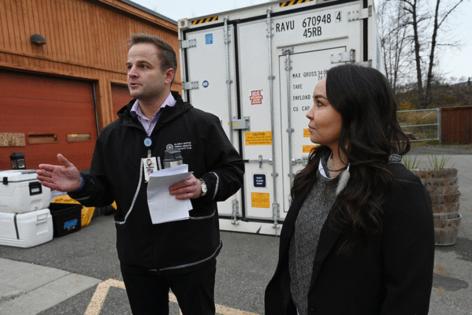'It is who we are': Alaska Native organizations collect whale meat, seals, fish and other traditional foods to help storm victims
Published in News & Features
ANCHORAGE, Alaska — Among the losses suffered by Western Alaska victims of ex-Typhoon Halong — destroyed four-wheelers, houses and lives — the destruction of the traditional foods they’d gathered for the winter is among the most deeply felt, Alaska Natives leaders say.
The flooding destroyed caches of seal, salmon, moose meat, berries and other gifts from the land, foods often gathered in unison by families and friends — efforts that can put food on the table for months.
Gathering subsistence foods and sharing them with others is one way Alaska Native people show love, said Liz Medicine Crow, the former head of First Alaskans Institute in Anchorage, which works to preserve Native culture among other efforts.
“It is who we are as a Native people,” she said.
Partly for that reason, the Alaska Native Heritage Center and the Alaska Native Tribal Health Consortium have installed Conex freezers in their parking lots to collect donations of traditional foods for hundreds of village residents who were evacuated to Anchorage.
The entities are working together in the effort, organizers said.
The tribal health consortium is already delivering the traditional food to victims within shelters.
In the coming days, the heritage center plans to distribute food it has collected to evacuees staying with families in Anchorage and nearby areas.
Across the city, numerous efforts are underway to collect food, clothes, bedding and other items needed by victims of the storm that slammed into Alaska on the weekend of Oct. 11.
More than 650 residents from Western Alaska were evacuated into Anchorage after the storm, with about half staying at shelters such as the Egan Center and others staying with family, city officials said last week.
The subsistence food drive might be one of the most unique relief efforts out there.
In a Conex freezer outside the heritage center on Thursday, Kelsey Wallace, head of the heritage center in northeast Anchorage, sorted through packages of donated foods.
“There’s fish eggs,” she said. “We’ve got some frozen halibut. There’s a lot of moose meat. There’s moose sausages.”
“We have fish heads for making delicious fish head soup,” she said, holding up large Ziploc bags of salmon heads.
“We also have reindeer tallow,” used in the akutaq or Eskimo ice cream that’s prepared with animal fat and berries, she said.
So far, the heritage center’s collection effort is in its early days, said Wallace, who is originally from the Yup’ik region in Southwest Alaska, the area hit hardest by the storm.
The center is waiting on a shipment of muktuk or whale meat from Alaska’s North Slope, she said. It’s part of the Niqipiaq or “real food” drive supported by organizations in that Iñupiaq region.
“As Yup’ik people and as Native people, we share what’s in our freezer,” Wallace said.
As food is ready to be distributed or picked up over the next couple of weeks, the center will share plans for how to access it on social media sites, she said.
Wallace said “incredible joy and camaraderie” is the overriding emotion as people deliver the foods.
“This connects us to the lands, to the waters, to each other,” she said. “These are foods that we have eaten since time immemorial.”
People can sign up for donation windows at the heritage center online or by calling 907-205-0068.
Shea Siegert, a spokesperson with the tribal health consortium, said the medical service provider is getting donations of subsistence foods to shelters with help from World Central Kitchen, a food relief group.
Siegert said a frozen seal recently arrived.
It was provided by Tim Ackerman, a Tlingit hunter from Haines in Southeast Alaska who often donates to the health consortium’s year-round traditional foods program for hospital patients.
The seal is waiting to thaw so it can be processed and prepared for distribution, Siegert said Thursday.
Siegert said the tribal health consortium’s Conex freezer is located at its patient lodging facility at 4001 Tudor Center Drive.
It’s behind the Alaska Native Medical Center, and accepts food weekdays from 9 a.m. to 4 p.m.
“We’re asking that if folks have small donations, please just go into the cafe there and talk to the food service staff and they will be able to intake those,” he said. “For larger donations, we ask that you please don’t try and move those on your own. Come without your donation into the lodging, and we will have some staff ready there to come out and help you.”
_____
©2025 Anchorage Daily News. Visit at adn.com. Distributed by Tribune Content Agency, LLC.







Comments